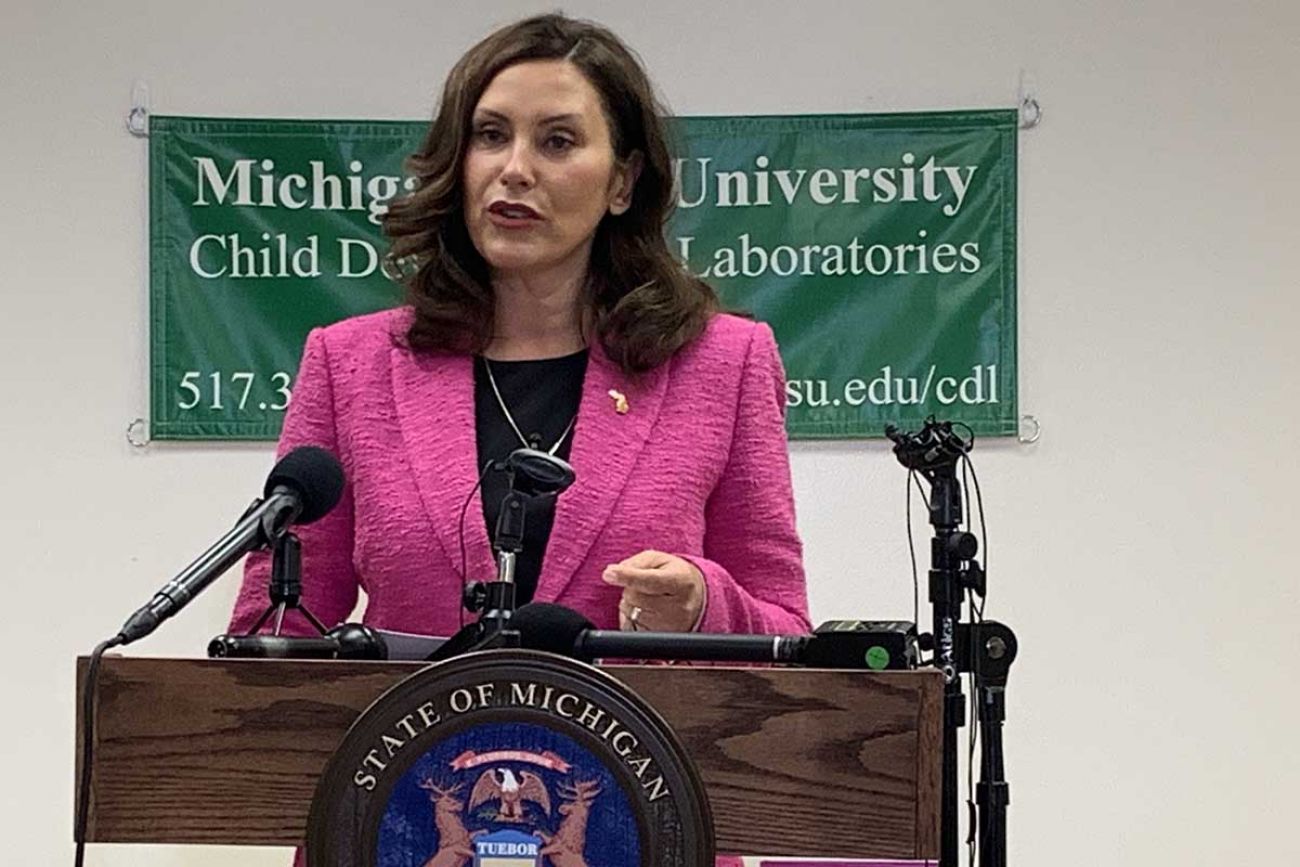Whitmer pitches big expansion of Michigan’s free preschool for 4-year-olds

Gov. Gretchen Whitmer proposed a massive expansion to the state’s taxpayer-funded preschool program Tuesday, which could eventually offer free preschool to an additional 17,000 Michigan 4-year-olds.
Whitmer proposed a $405 million infusion over three years to the Great Start Readiness Program, which offers preschool to 4-year-olds from low- and moderate-income families. GSRP currently operates on an annual $237 million budget.
The money would be a combination of federal COVID relief funds and cash from the state’s school aid fund. After three years, when the proposal is fully phased in, the expansion would cost the state an estimated $150 million annually.
Related:
- Whitmer pitches $1.4 billion plan making Michigan child care more affordable
- Child tax credits are expected to start arriving in July. Here’s what to know.
- Gov. Whitmer pitches financial incentives to recruit more Michigan teachers
- Gov. Whitmer against expanding Michigan’s read-or-flunk law to 4th-graders
Combined with a separate $45 million increase proposed in Whitmer’s 2021-22 budget in May, the governor’s efforts, if approved, represent a stunning financial shot in the arm for a program that has been proven to improve academic skills of participants.
The additional funds would guarantee enough classroom seats for every eligible 4-year old whose family chooses to participate. Eligibility guidelines would remain the same, with children from families earning up to 250 percent of the federal poverty line ($66,250 for a family of four, for example) attending GSRP for free.
Currently, about 43,000 4-year-olds are enrolled in GSRP or the federally funded Head Start program. That’s about two out of three children who are eligible according to their family’s income. State officials hope 90 percent of eligible children will enroll by the time the expansion is fully ramped up, in three years.
“We have a unique opportunity right now to make the type of investments in early education and preschool that will pay massive dividends by improving health, educational and social outcomes for our children decades down the line,” Whitmer said Tuesday in a news conference at a child care center at Michigan State University. “Parents across our state are aware of the importance of early education and now we have to seize this chance to eliminate waitlists for eligible children.”
The proposed increase isn’t a sure thing. The Republican-led state House and Senate would need to approve the funding hike. But Republican leaders in the past have supported investment in early childhood education, including Whitmer’s Republican predecessor Rick Snyder, who was responsible for one of the largest increases in state-funded preschool in the nation when he expanded GSRP in 2013.
Improving education has been a key goal of the Whitmer administration. In the National Assessment of Educational Progress, often called the Nation’s Report Card, Michigan students generally score around the middle of the pack or slightly below average.
Michigan also is below the national average in the percent of adults with college degrees, which impacts personal income and the ability of the state to attract new businesses.
Early childhood education is seen as one key in improving academic performance of students in Michigan’s public schools.
A 2019 study found that students who enrolled in GSRP across Michigan scored higher four years later when they reached third grade on Michigan’s standardized test, the M-STEP, in both English language arts and math than their demographically-similar classmates who didn’t enroll in GSRP.
Scores were higher for students who attended GSRP as 4-year-olds in every racial group and among students with disabilities.
A separate 2018 study in Ottawa County found GSRP students were twice as likely to meet literacy and language growth targets between fall and spring of the school year as 4-year-olds not enrolled in the program.
Still, growth of the program has been stymied by funding issues. Many of the programs are operated by school districts, which sometimes lose money with every GSRP student they accept.
The state hasn’t increased the rate provided to schools and community-based providers for a full-day GSRP student since 2014, when the state began paying local school districts $7,250 for a full-day preschool seat.
In the 2020-21 school year, Traverse City Area Public Schools threatened to drop GSRP because of a $60,000 gap between state funding and district costs. The district was able to open its doors for about 100 4-year-olds in the fall after local foundations pitched in to defray costs.
Some families lack transportation to get children to GSRP programs, or don’t know that free preschool is an option.
In 11 of the state’s 57 intermediate school districts, which provide services to local school districts, less than 60 percent of eligible 4-year-olds are enrolled in GSRP or Head Start.
Getting as many low- and moderate-income 4-year-olds into free, high-quality preschool allows more parents to take jobs, and those children to do better academically when they enter kindergarten, Whitmer said.
Highlights of Whitmer’s proposed expansions announced in her budget in May and Tuesday include:
- Increasing the per-student payment to GSRP providers to match the per-student foundation grant given to schools for K-12 students.
- Increasing the number of slots for children to match the number of eligible children — an additional 22,000 positions. Officials set a lofty goal of enrolling 90 percent of the state’s eligible 4-year-olds, which would be an additional 17,000 students.
- Grants to help establish or expand GSRP classrooms.
- $50 million to expand preschool options in underserved areas, improve curriculum, financially support preschool teachers for continued education and increase marketing to spread the word about the program.
- Increase funding for transportation to and from GSRP classes from $10 million to $25 million.
The Grand Rapids Chamber of Commerce issued a statement supporting GSRP expansion.
“In a letter to Legislative leaders earlier this year, we called for more funding for GSRP,” wrote Rick Baker, the chamber’s president and CEO. “(We) are thrilled to see the governor's recommendation to increase this program to meet the current demand from Michigan families.”
Alan Oman, director of early childhood learning at the Washtenaw Intermediate School District, told Bridge Michigan he was pleased with Whitmer’s proposal.
“It’s important that working families have access to affordable and quality care,” Oman said. “Early education is really the foundation of a child’s success in school and later in life.”
See what new members are saying about why they donated to Bridge Michigan:
- “In order for this information to be accurate and unbiased it must be underwritten by its readers, not by special interests.” - Larry S.
- “Not many other media sources report on the topics Bridge does.” - Susan B.
- “Your journalism is outstanding and rare these days.” - Mark S.
If you want to ensure the future of nonpartisan, nonprofit Michigan journalism, please become a member today. You, too, will be asked why you donated and maybe we'll feature your quote next time!




